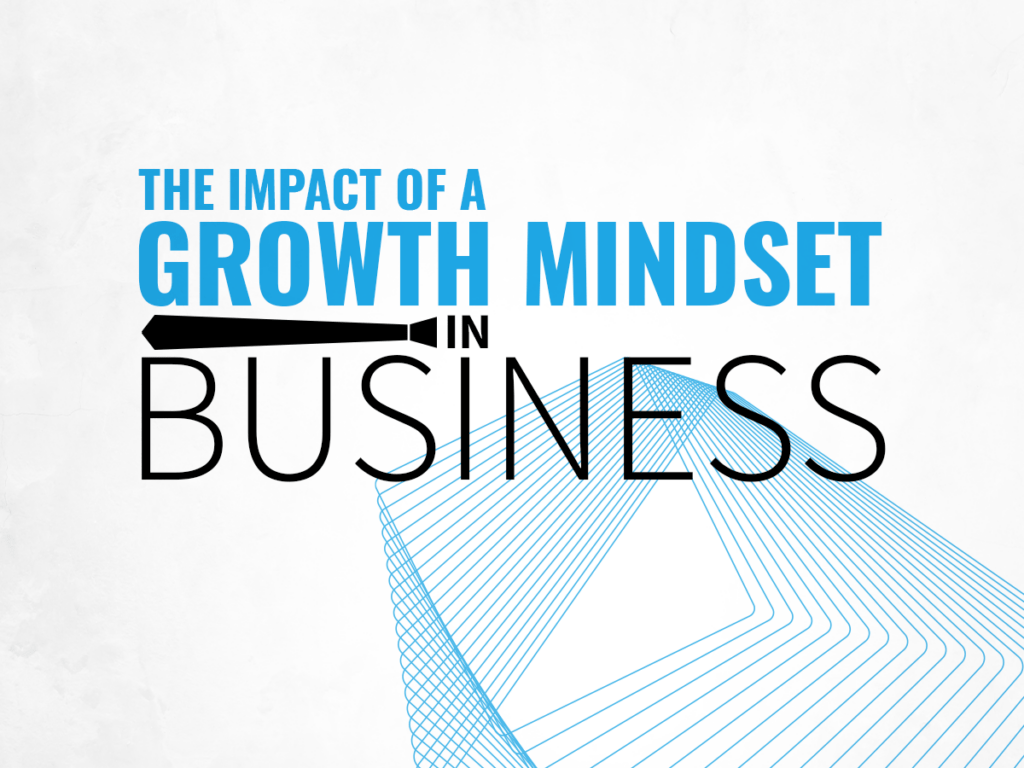To lead a business or team to success, you must first embrace the right mindset — a growth mindset. The impact a growth mindset has on any business is powerful. It requires unshackling yourself from your fixed beliefs of limited potential and taking every opportunity to learn and grow.
A growth mindset example is openness to new ideas. If a team has a growth mindset, all its members will be alright with letting everyone speak up and share their thoughts. A team with this mindset will hear everyone out and not try to shut down ideas that are “different” or out of the box. Perseverance, learning from failure, valuing hard work, and encouraging experimentation are also proof of a growth mindset. But what exactly is it?
What is a Growth Mindset?
When a person has a growth mindset, they believe they have the ability to develop their skills and knowledge through dedication and hard work. In other words, it means you believe your success comes from your consistent efforts of working through your challenges.
Having a growth mindset at work is one of the keys to success in your career. No matter what field you choose, you’ll face challenges. Focusing on what you can learn rather than what you don’t know will help you become a better professional. If you focus on growth, you’ll welcome challenges and build skills that can help you overcome them. In contrast, with a fixed mindset, you’ll box yourself in with your current skill set to try and overcome obstacles. If your current skills can’t help, you give up. When you adopt a fixed mindset, you don’t learn anything new.

Leaders with a growth mindset tend to focus more on the process rather than the outcome. They identify the opportunities available for their team — even during times of adversity — and see the potential for each member to grow. This creates a healthy culture of accountability that allows their business to thrive. In times of failure, a growth mindset prevents them from believing all their efforts were in vain. Instead, they make every effort to learn from their setbacks. They focus on their team’s growth to overcome any business challenges.
What is a Fixed Mindset?
A fixed mindset, on the other hand, does not encourage any of these ideals. A fixed mindset consists of the belief that people’s basic qualities — such as intelligence and talent — are fixed traits that can never be changed or developed.

Leaders with a fixed mindset tend to be results-oriented to the extreme. When setbacks arise, they often interpret these challenges as failures and look for someone to blame. Rather than recognizing the opportunity to learn and grow, they step in to fix the problems themselves because they don’t trust their team to improve.
Executives who lead their companies with a fixed mindset tend to prevent progression due to:
- A defensive work environment where people are more invested in ensuring the security of their own jobs instead of working together to grow the company.
- A toxic work culture where employees are too scared to take risks, express their ideas, or innovate due to fear of being seen as incompetent.
- An unmotivated team that is not performing or expanding to their fullest potential.
- Constant micro-managing or firing of employees, which often creates miscommunication, negativity, and stress.
Why is It Important to Have a Growth Mindset?
People with a growth mindset also tend to be resilient, and resilient individuals are more engaged at work. They have an improved sense of purpose, are more committed to their organization, and have good interpersonal relationships with colleagues. Focusing on growth, instead of on limitations, lets you become more creative with your approaches to problems. More possibilities are open to you, because you don’t limit yourself to what you know. Ultimately, having a growth mindset means being better equipped to handle work stresses and overcome these.
Managers who embrace a growth mindset at work are better equipped to guide others. Since they embrace failure, they will be understanding of teammates or subordinates who seem to be underperforming. A growth-focused manager looks at improvements a teammate can implement instead of criticizing them for being less productive than they could be. Growth-focused managers will also be better at identifying areas for development in individuals. They’ll find it easier to craft performance improvement plans or coach a coworker into becoming a far more effective employee.
Finally, a growth-focused manager won’t be disheartened by challenges in interacting with clients or customers. They’ll be a good role model of the attitude to take when in customer service or other client-facing departments. Managers who focus on what teams can contribute, instead of its faults. He or she will know how to build and cultivate influence.
How to Adopt a Growth Mindset to Drive Business
Researchers have found that business leaders who practice a growth mindset tend to prioritize transparency, development, and empowerment. Here are 4 simple tips that can help you learn how to have a growth mindset.
1. Seek Passionate Learners
As a business expands, individuals often struggle to see new solutions or ideas. This can stall learning and cause businesses to become stuck in the same model of thinking. Expanding your business requires recruiting people with diverse backgrounds and experiences to enhance innovation. This means being open-minded.

In order to adopt a growth mindset to fuel your organization, it’s important to focus on people’s capacity — not just their achievements. Recruitment should value individuals who possess a real commitment to learning, for they are the foundation of cultivating a positive work culture. Studies have shown that those who value continual learning are more likely to develop independently and collaboratively and adapt to challenges that may arise. Their natural growth mindset will foster better communication and encourage more expression of ideas, moving your business towards success.
2. Build a Culture That is Willing to Give & Receive
Failure is an inevitable part of growth. Adopting a growth mindset means accepting the possibility that you might fail, and having the determination to learn from your setbacks. Embracing challenges is key. Any sort of innovation or creativity within a business would not be possible if people were not willing to take risks. This often starts from the top. Research has shown that leaders who view their staff as capable of taking on challenges tend to be better positioned for success.
In fact, they are better equipped to continually push the boundaries of their own capabilities and that of their teams. These leaders often utilize failure as an innovative learning tool for growth. They trust their employees to take on leadership roles and give them the independence to try new things and learn from their mistakes.
3. Value and Reward Progress

Employees who work at growth-mindset companies tend to feel more motivated in doing their best because they feel their personal development and hard work are being valued. In fact, studies have shown that employees in growth mindset organizations pursue more innovative projects because they receive greater organizational support.
When companies acknowledge and value their employees’ hard work, employees report feeling more empowered and committed to their work. They believe they have the potential to learn, grow, and thrive alongside their company.
On the other hand, employees who work at fixed-mindset companies report a high level of deception and cheating among employees, presumably to gain acknowledgment from executives for their achievements. By valuing progression over accomplishments, employees will have greater motivations to work more collaboratively and communicate more transparently.
4. Encourage Employees to Explore Outside of Their Elements
Establishing a business growth mindset means enabling each individual to be more than just their job. Developing new skills — even if it may be outside of one’s daily work — is always valuable. Here at Wing, we believe that understanding and learning roles other than your own can promote greater collaboration, empathy, and perspectives of approaching things. By setting aside time to build on those skills, people will feel more productive and inspired at work.
5. Offload Unnecessary Tasks to a Virtual Assistant
You might think that outsourcing tasks runs counter to having a growth mindset at work. After all, isn’t hard work part of being growth-focused? While it is generally true that you become a better worker the more effort you put into work, that’s not always the case. At times, powering though a task results in lost productivity or a substandard output. What’s more, having a growth mindset is less about doing x amount of tasks. Instead, it’s knowing which activities to pursue, which ones will make you a better professional.
Delegating tasks to a competent and skilled virtual assistant lets you focus on your growth at work. When choosing an assistant, be sure to find one who aligns with your work style, understands your needs, and is proactive. Choose a VA who is also growth-focused, willing to learn, accepts feedback, and isn’t afraid to develop new skills. When you surround yourself with people who aspire for the same things as you, it’ll be easier to reach your goal.
Will You Take Your Business to the Next Level?

Any business that wants to position itself to thrive must adopt a growth mindset to succeed. A growth mindset not only enhances the quality of an organization for the greater good of its employees but for its future as well. When adversity strikes, having a growth mindset will allow you to see any challenge as an opportunity to improve and move forward — not as a hindrance to your success. When practicing a growth mindset, remember to:
- Be willing to learn from your mistakes and embrace new challenges & setbacks.
- Receive & be willing to accept any constructive feedback.
- Encourage innovation & be open to new opportunities.
- Develop new skills, acquire new knowledge, and commit to a lifetime of learning.
Anyone can initiate a shift to a growth mindset at any time — it just requires perseverance, practice, and time. By embracing this new outlook, you will lead a more authentic work environment and unleash the creative, problem-solving innovator that resides within you.

Roland Polzin is a co-founder and the CMO at Wing Assistant, a product-driven managed B2B marketplace connecting SMEs with vetted talent and making delegation efficient and secure. In 2020 he received his MBA from The Paul Merage School of Business at UC Irvine, and in the same year, he and his fellow Wing co-founders joined the Skydeck Accelerator at UC Berkeley. Previously, Roland served in the German Army as Chief PR Officer.






